
Dave Kopilak
503.467.0390
EDUCATION
University of Oregon School of Law, Juris Doctor, Order of the Coif
West Virginia University, B.A. in History
ADMISSIONS
Oregon
Washington
PRACTICE AREAS
Industries
Dave Kopilak focuses his practice on business and corporate law. He has extensive experience assisting clients with business structuring, entity formation, mergers and acquisitions, corporate securities, equity incentive plans, and all types of commercial contracts.
Dave was the primary drafter of Oregon Ballot Measure 91 (2014) and understands the business, corporate, and securities law challenges that cannabis businesses face. Additionally, Dave was the primary drafter of Oregon Ballot Measure 109 (2020), also has known as the Oregon Psilocybin Services Act, which was approved by Oregon voters on November 3, 2020. Dave has been following the meetings of the Psilocybin Advisory Board and its various subcommittees and has a unique insight into the numerous challenges that Oregon-licensed psilocybin businesses will face as the industry prepares to launch in 2023.
Prior to co-founding Emerge Law Group, Dave was a shareholder at Schwabe, Williamson & Wyatt, P.C., Oregon’s second largest law firm. He also worked on-site at Intel Corporation where he drafted and negotiated numerous contracts and created several new legal document templates for complex business scenarios. For eight years, Dave was an adjunct professor at the University of Oregon School of Law, where he taught a mergers and acquisitions lab class. Dave attended University of Oregon School of Law where he earned Order of the Coif honors, and was the Executive Editor of the Oregon Law Review.
Outside the practice of law, Dave has engaged in a number of entrepreneurial ventures. He is the president and co-founder of ClayTablet, a company that provides legal document templates to Oregon and Washington attorneys. He also produced a documentary movie that won awards at several film festivals, and for several years designed and published a calendar that was carried in regional bookstores.
Activities
Awards
Top 200 Cannabis Lawyers (2021)
Top 200 Psychedelics Lawyers (2021)
Memberships
Oregon State Bar Cannabis and Psychedelics Law Section, Member
Oregon State Bar Business Law Section, Member
Executive Committee Member (2010-2014)
Oregon Liquor and Cannabis Control Commission, Marijuana Advisory Committee, Former Member
International Cannabis Bar Association, Member
National Cannabis Industry Association, Member
NCIA Banking Committee (2017-2019)
Community Activities
University of Oregon School of Law, Adjunct Professor, Mergers & Acquisitions
Speaking Engagements
January 26, 2022
Webinar
The Seminar Group, Legal and Regulatory Landscape for Psychedelics
Oregon’s Measure 109 and Future Licensing
December 16, 2021
Webinar
Oregon State Bar Business Law Section Annual CLE
2021 Cannabis Law Updates
October 30, 2021
Webinar
Lewis & Clark Graduate School of Education and Counseling
Entheogen Assisted Psychotherapy and Integration Training Series
Legal and Ethical Aspects of Working with Psilocybin
September 23, 2021
Webinar
Cannabis Law Institute
Opening Access to Psilocybin: Oregon’s Psilocybin Services Act (Measure 109) and Right to Try Litigation
March 17, 2021
Webinar
Willamette Law School
Opening Access to Psilocybin Therapy: The Oregon Psilocybin Services Act and The Right to Try, Dave Kopilak and Kathryn Tucker
December 14, 2020
Webinar
University of Washington School of Law
Recent Developments Regarding Access to Psilocybin Therapy: Oregon’s Pioneering Psilocybin Services Initiative and Opening Acess via Right to Try in Washington
October 15, 2020
Webinar
Oregon Women Lawyers
Ballot Measure Breakdown: Measure 109
May 3, 2019
Portland, OR
39th Annual Northwest Securities Institute
The Cannabis Landscape at Home and Abroad, Dave Kopilak
Press
February 16, 2022
Dave Kopilak quoted in Willamette Week
These Four Companies Want to Take You on a Psychedelic Voyage in Oregon
February 4, 2022
Dave Kopilak quoted in Oregon Business
A Niche Market Mushrooms
March 10, 2021
Dave Kopilak mentioned in Westlaw Today
Why dying patients are suing for access to magic mushrooms
May 18, 2018
Dave Kopilak quoted in The Oregonian
Feds will target marijuana black market, overproduction in Oregon
January 4, 2018
Dave Kopilak quoted in Marijuana Business Daily
Industry insiders, state officials in recreational cannabis markets vow to stay the course
July 9, 2014
Dave Kopilak quoted in Marijuana Business Daily
Oregon Marijuana Bill Good for Businesses, Backers Say
Experience
Primary Drafter of Oregon Measure 109, legalizing psilocybin for therapeutic use in Oregon.
Primary Drafter of Oregon Measure 91, legalizing recreational cannabis in Oregon.
Dave’s Blogs & News
-
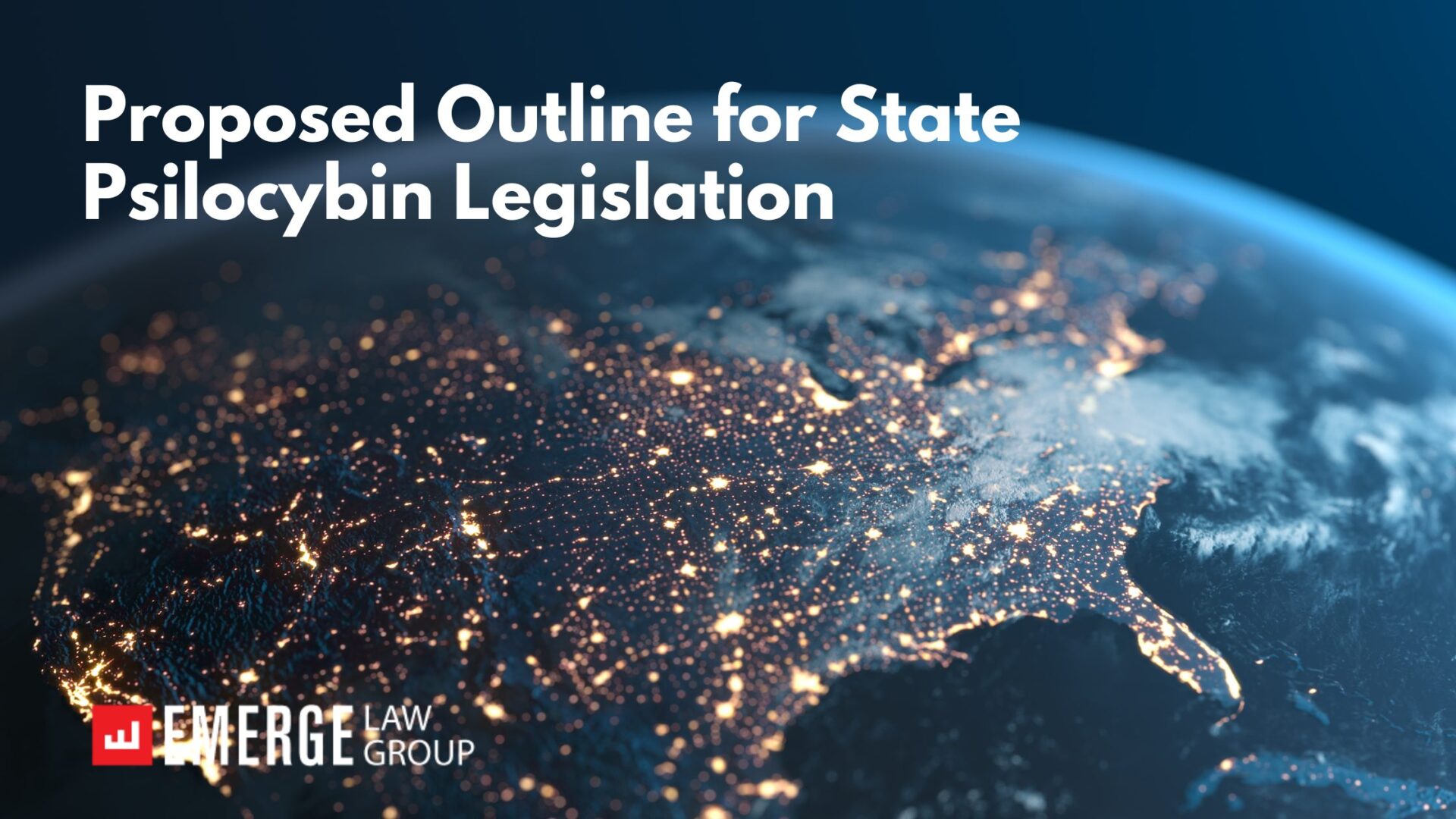
Proposed Outline for State Psilocybin Legislation
Emerge Law Group attorney Dave Kopilak was the primary drafter of Oregon Ballot Measure 109, also known as the Oregon…
-
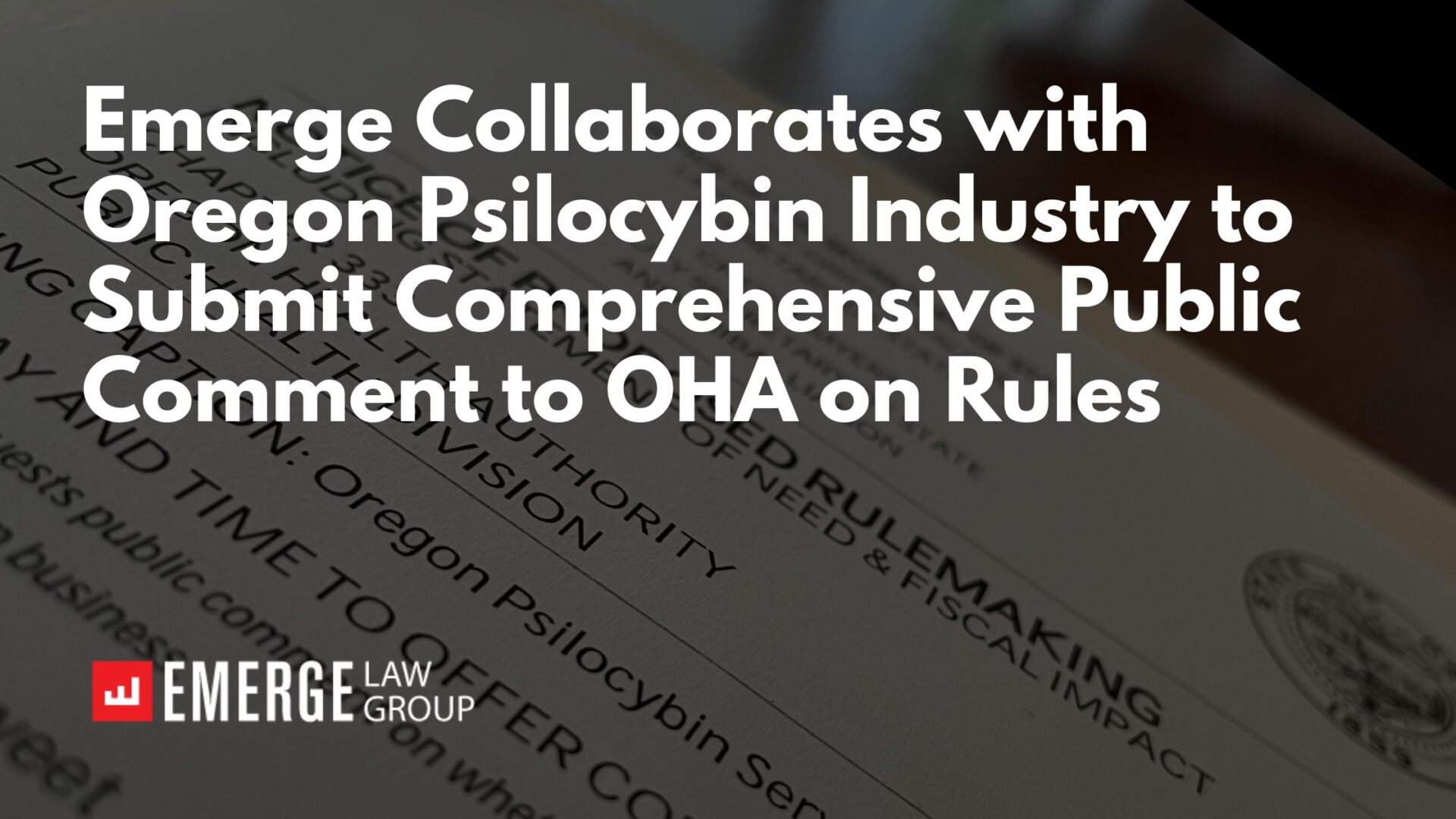
Emerge Collaborates with Oregon Psilocybin Industry to Submit Comprehensive Public Comment to OHA on Rules
On October 21, in response to serious concerns about the Oregon Health Authority’s (OHA) proposed Oregon Psilocybin Services (OPS) rule…
-
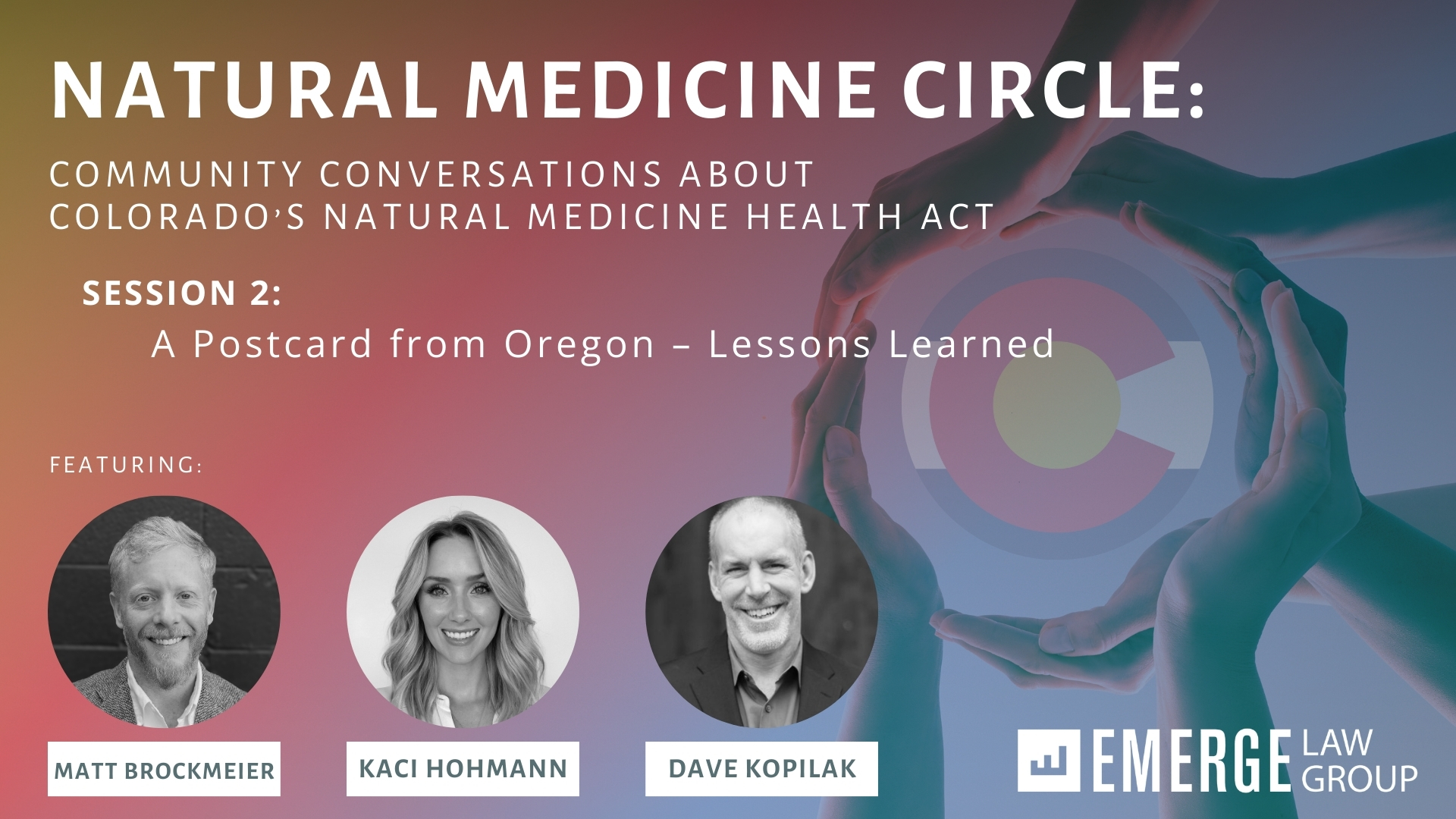
Natural Medicine Circle – Session 2: A Postcard from Oregon – Lessons Learned
Emerge Law Group is excited to announce the next FREE live virtual event in our series, “Natural Medicine Circle: Community Conversations…
-
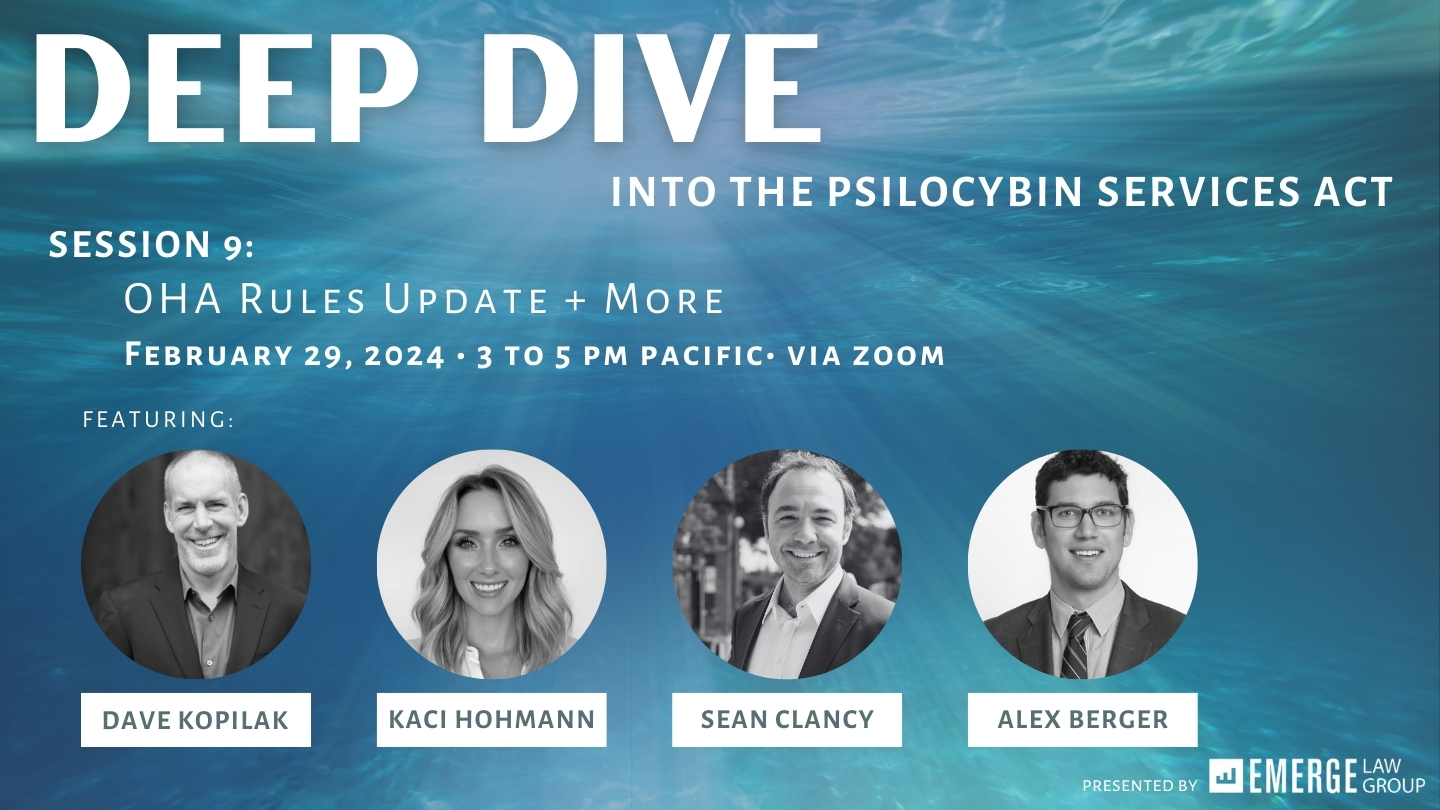
Deep Dive Webinar Series – Session 9: OHA Rules Update + More
Emerge Law Group presents the first 2024 installment of its FREE virtual event series “Deep Dive Into the Oregon Psilocybin…
-

Compliance with the Corporate Transparency Act
Beginning January 1, 2024, a new federal law known as the Corporate Transparency Act (“CTA”) will take effect. The CTA…
-
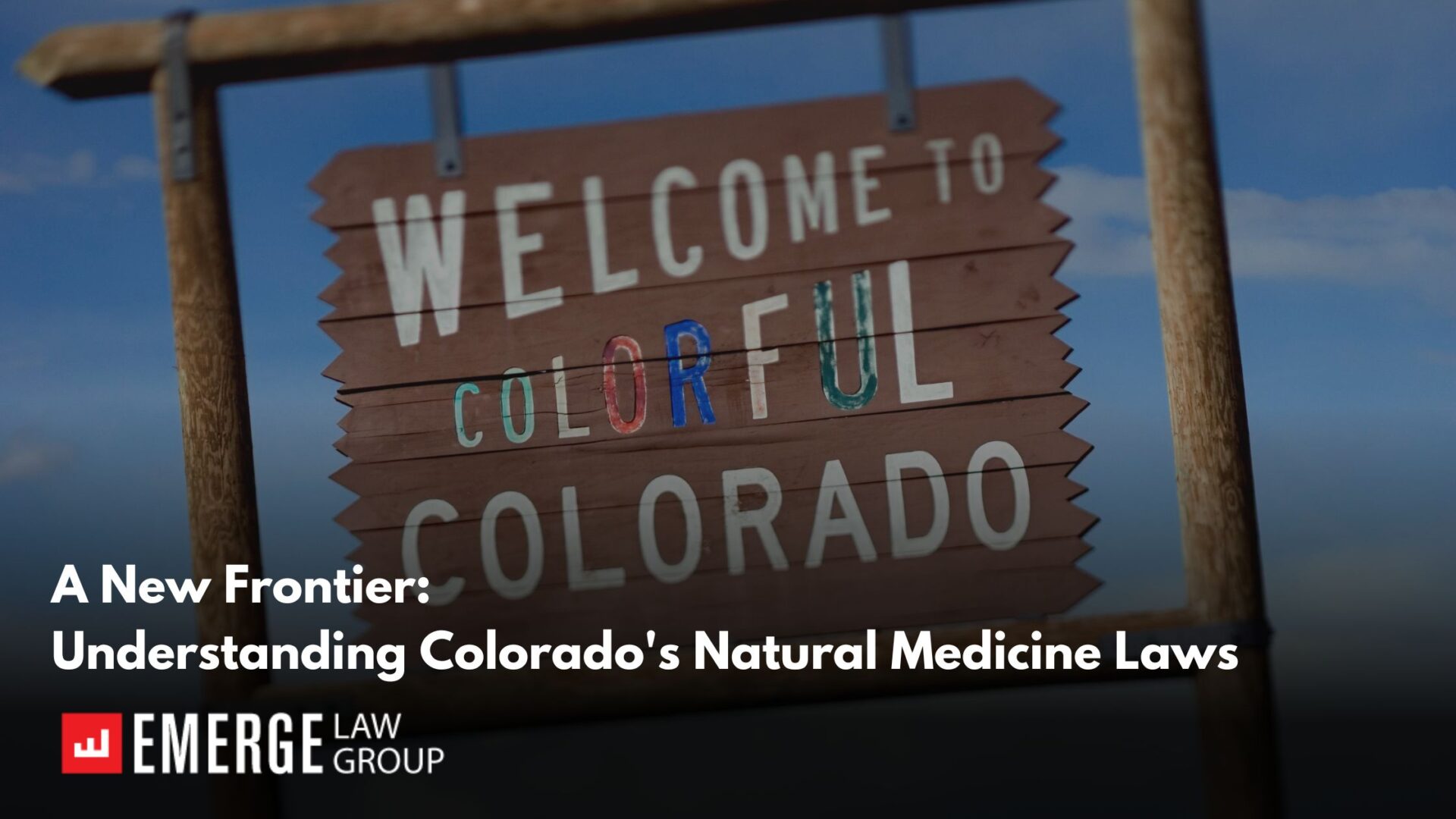
A New Frontier: Understanding Colorado’s Natural Medicine Laws
Authors: Matt Brockmeier, Of Counsel; Kaci Hohmann, Attorney In a historic development echoing the Centennial state’s landmark 2012 ballot initiative…
-
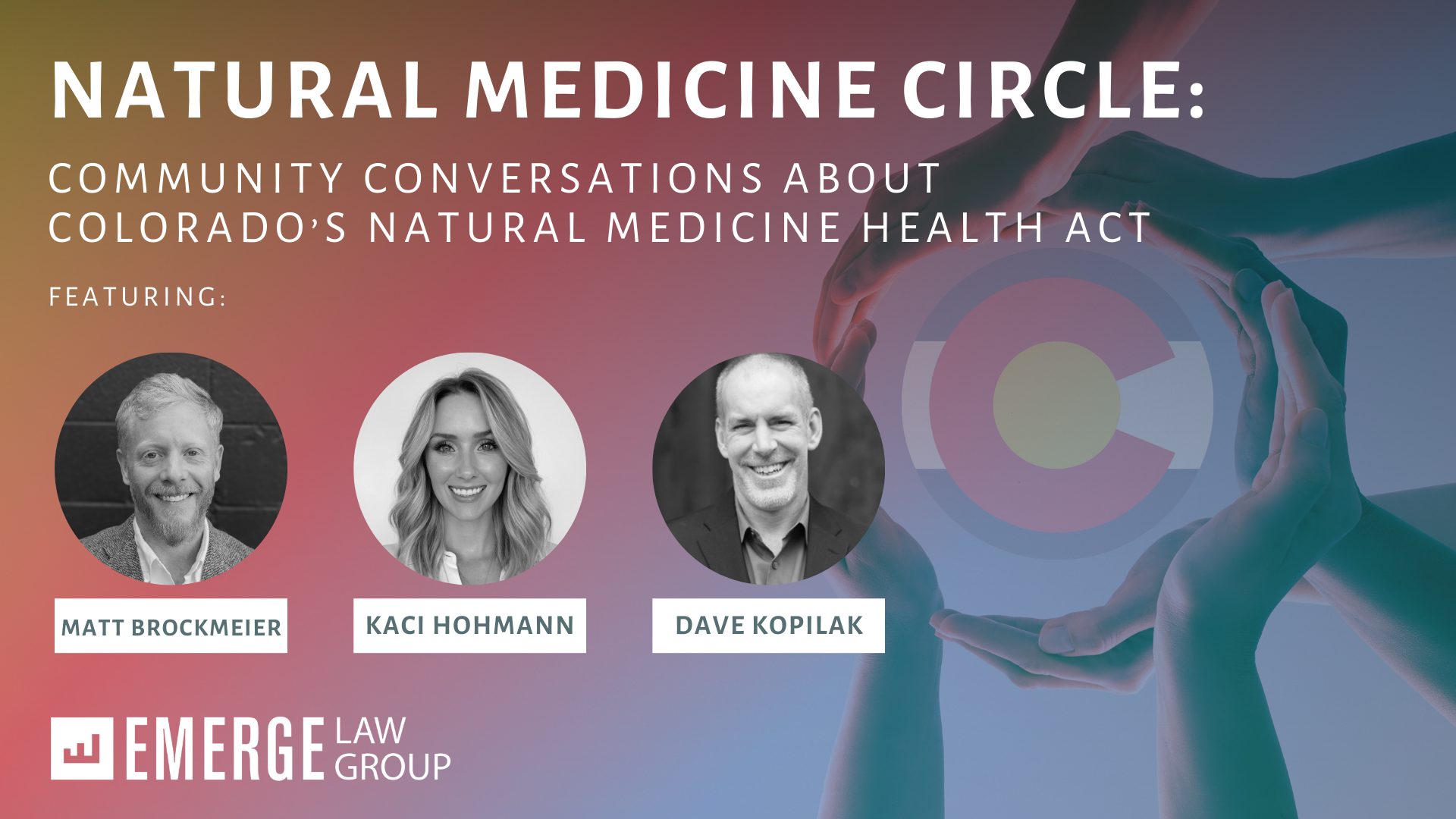
Emerge Law Group announces FREE virtual event series, “Natural Medicine Circle: Community Conversations About the Colorado Natural Medicine Health Act“
This is the first of a series of in-depth conversations with the community about various legal and business issues involving…
-
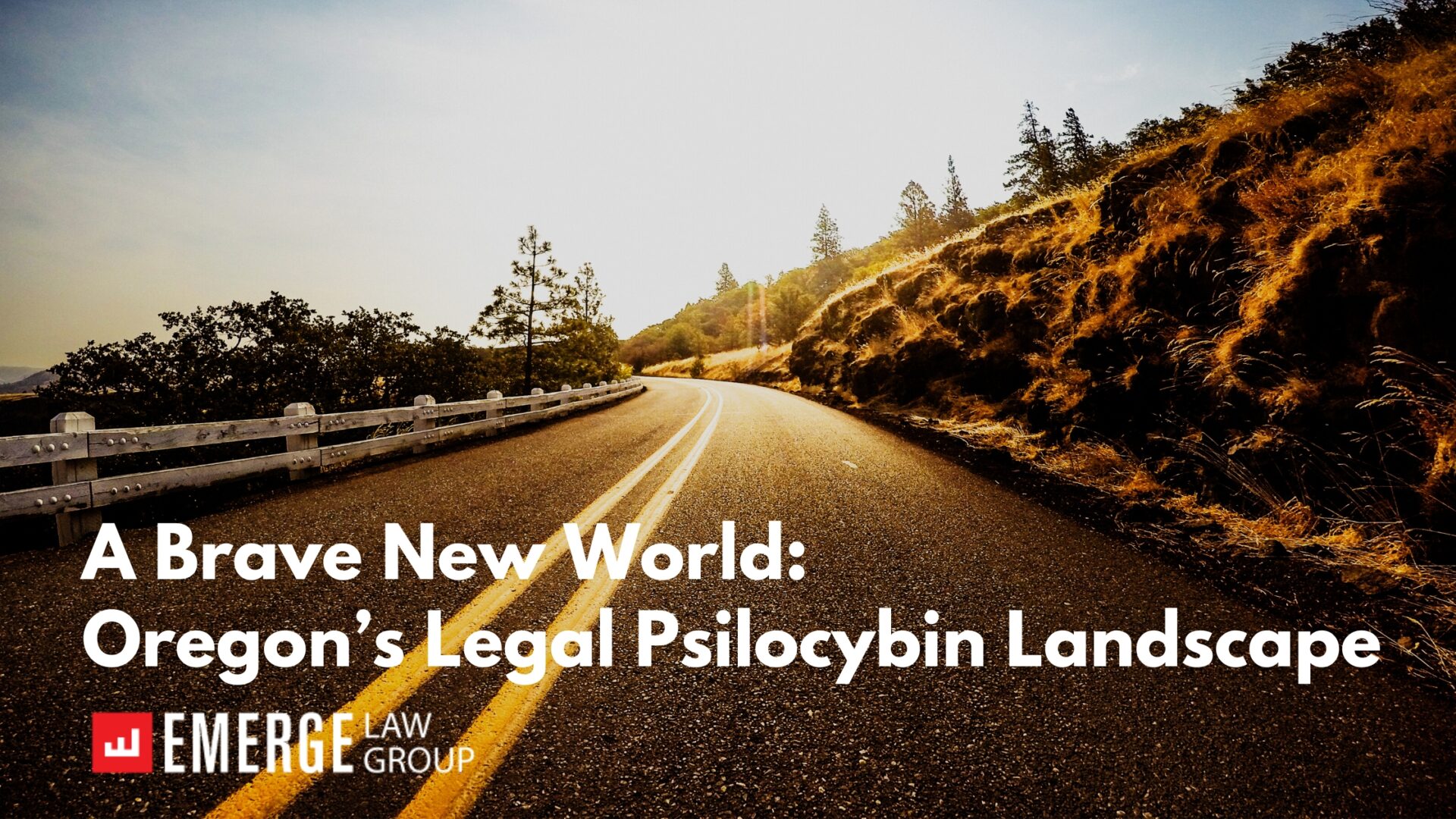
A Brave New World: Oregon’s Legal Psilocybin Landscape
Authors: Dave Kopilak and Kaci Hohmann This article first appeared in the Oregon State Bar Business Law Section Newsletter •…
-
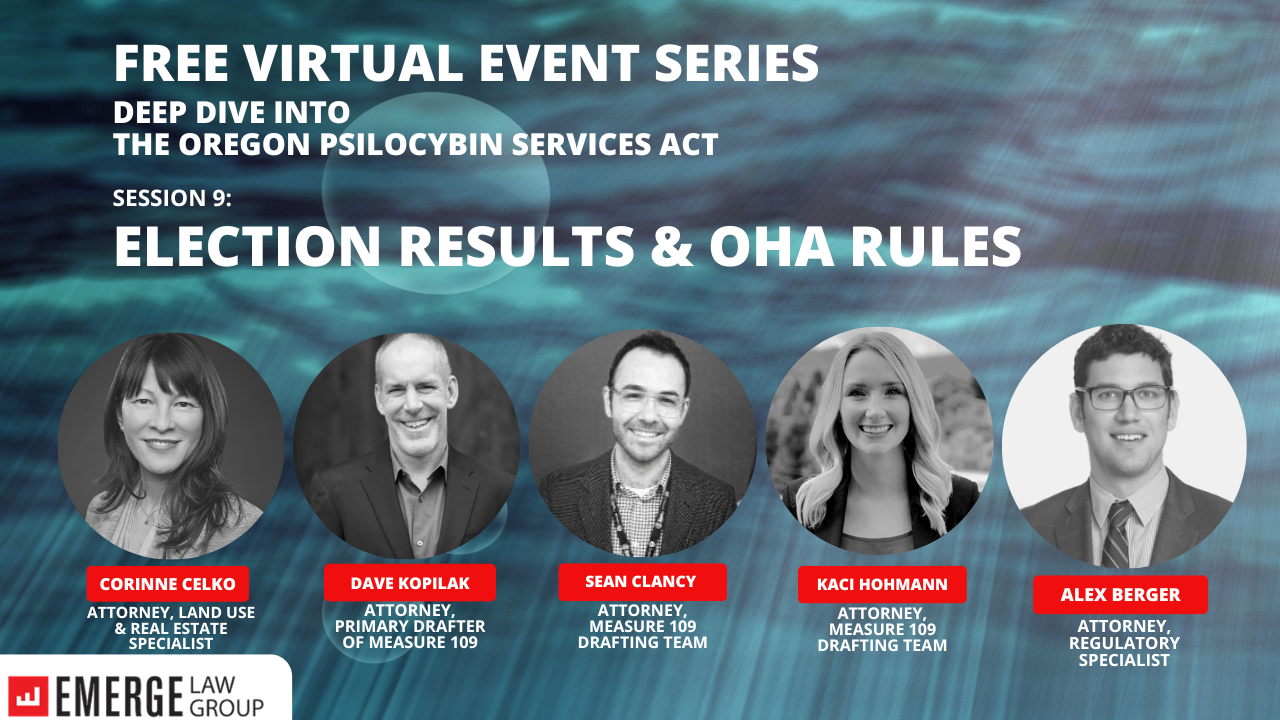
Next Deep Dive Webinar: Revised OHA Rules and Election Day Opt-Out Results
Two major events relating to the Oregon Psilocybin Services Act are right around the corner. First, the Oregon Health Authority…
-
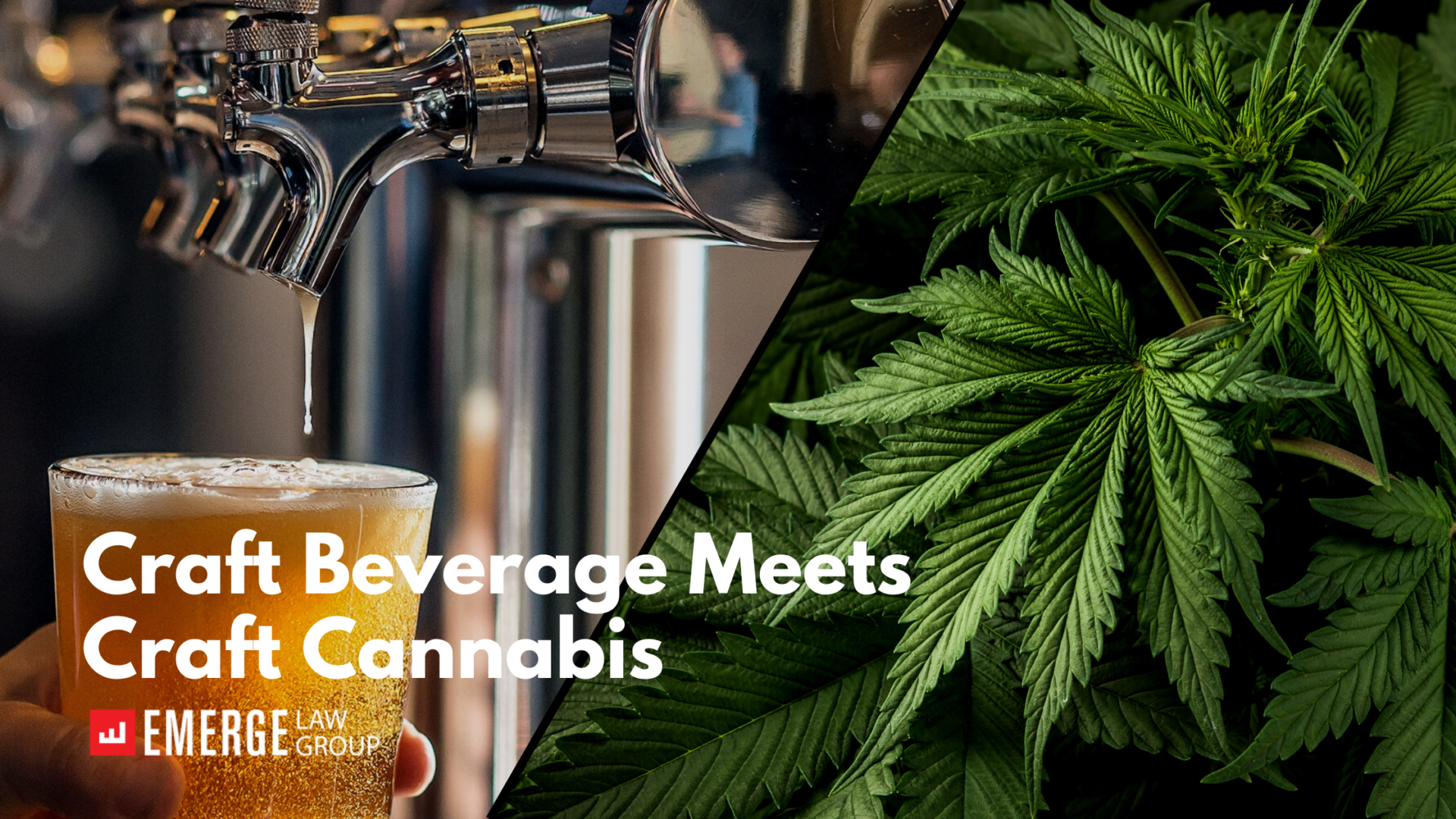
The Craft Beverage Industry Expands into to the Cannabis Space and Vice Versa
Author: Jake Cormier As the markets for legal cannabis continue to expand nationwide, companies continue to develop new products to…
-
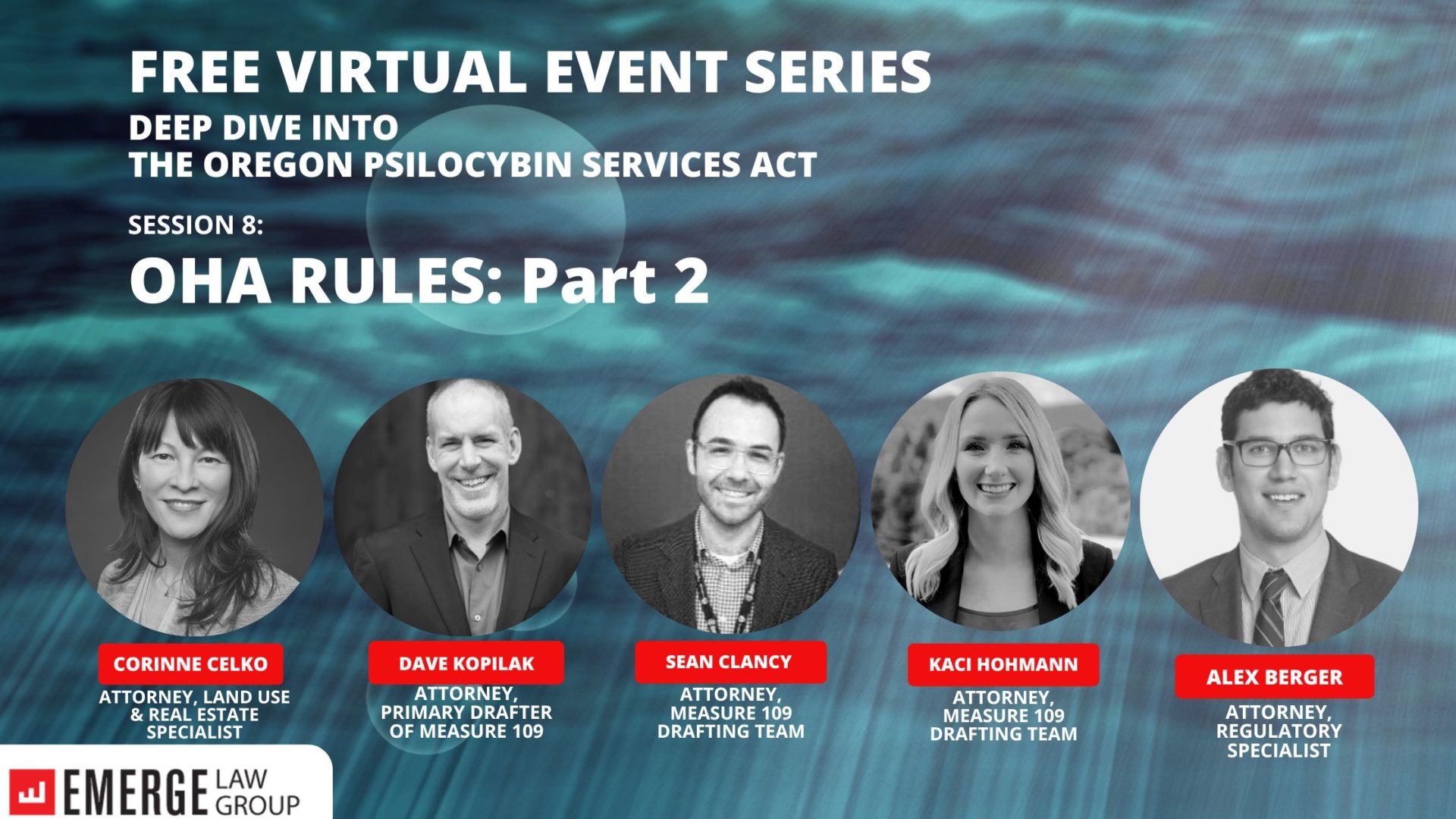
The OHA’s Rules Are Out! Next Deep Dive Webinar Scheduled.
On September 1, 2022, the Oregon Health Authority released the second installment of draft rules implementing the Oregon Psilocybin Services…
-
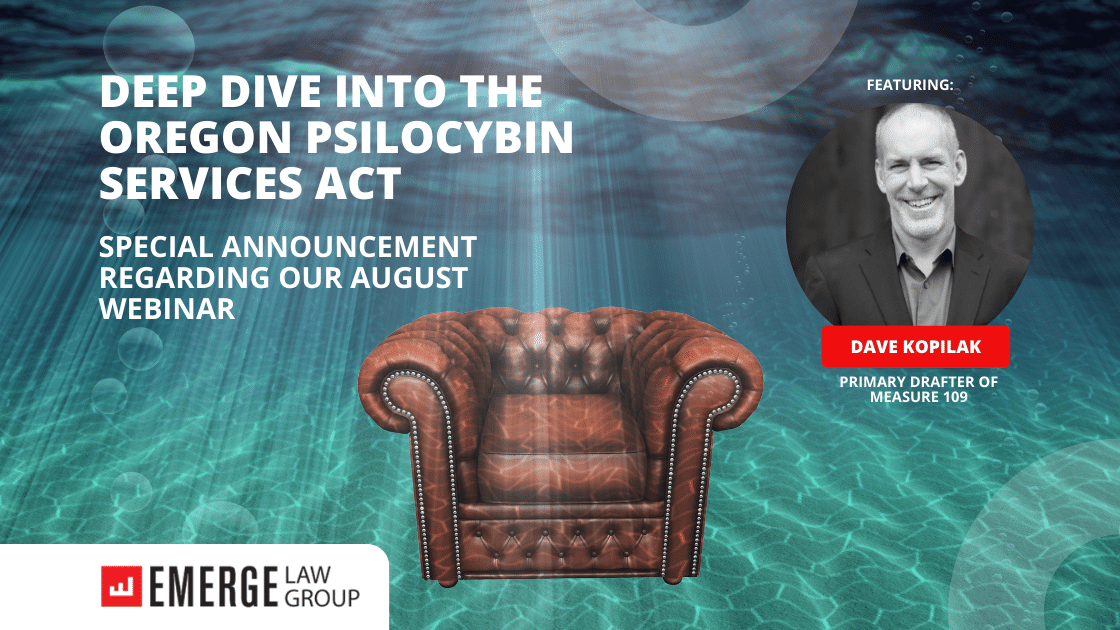
Special Announcement Regarding Emerge Law Group’s Next Deep Dive Webinar
Our Psychedelics Industry Group has been holding “Deep Dive” webinars on the last Thursday of each month. However, we have…